Tan Dun premieres new work with Philadelphia Orchestra
Updated: 2013-11-01 04:30
By CAROLINE BERG in New York (China Daily USA)
|
||||||||
|
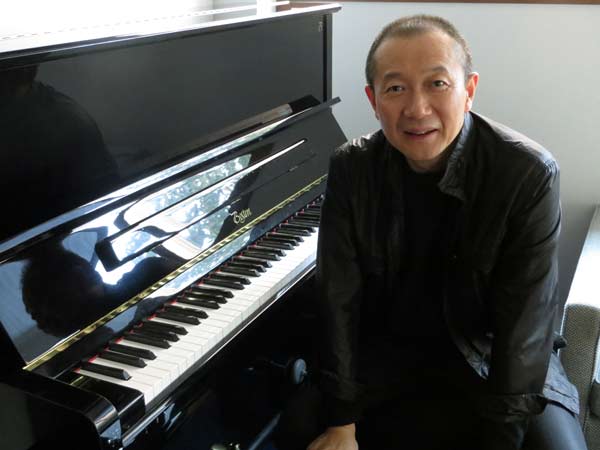 |
|
Chinese composer Tan Dun is one of three composers premiering work in a micro music festival with the Philadelphia Orchestra this weekend. [Caroline Berg/China Daily] |
It may be called "micro," but there's nothing small about the Philadelphia Orchestra's undertaking of a three-day music festival this weekend.
Three is the key: three new works written for three principal players premiering in the orchestra's "micro-festival," running Oct 31-Nov 2. The program is a central artistic initiative of music director Yannick Nezet-Seguin's, now in his second season with the orchestra.
"Very soon after I came on as music director, I met with a few of our musicians, who said there were some pieces they had asked some composers to write for them, and then we came up with this idea," Nezet-Seguin told China Daily.
Instead of choosing just one concerto, Nezet-Seguin said the orchestra decided to put together this micro-festival to focus on three works that span an array of contemporary classical music styles.
"Frankly, there's never been one unanimous style in any given era of music, but I think it's even more wonderful today to see that everyone brings a different background to his or her writing of music," the music director said.
Principal harpist Elizabeth Hainen is premiering Chinese composer Tan Dun's Nu Shu: The Secret Songs of Women, a symphony for micro films, harp and orchestra; principal flutist Jeffrey Khaner is premiering Iranian composer Behzad Ranjbaran's Flute Concerto; and principal bassoon Daniel Matsukawa is premiering Pennsylvania native David Ludwig's Pictures from the Floating World.
"We always encourage our orchestra to be flexible with different styles," Nezet-Seguin said. "We also want our audience's ears to be flexible to receive a panorama of the music that is written today."
Each composition will be played twice over the three-day micro-festival, and each program will also feature Leonard Bernstein's Overture to Candide and Sergei Rachmaninoff's Symphonic Dances. After each performance, the composers will share their insights into the creative process in discussions with Nezet-Seguin.
"One very important thing about this festival is that our intention is not to play all the three concertos every night, which means that some people will hopefully come two nights in a row to be able to experience all three compositions," Nezet-Seguin said.
The music director said the format of the micro-festival allows for large-scale productions like Tan's multimedia composition that includes 13 micro films of the Nu Shu village in Hunan province, China, shot in three angles to be projected on three screens during the Nu Shu performance.
"I find this [program] is precisely what I'm interested in in new music," Nezet-Seguin said. "Tan Dun's work should be promoted in the right context and the right environment because the multimedia is so powerful with the story that is behind it."
It was a five-year journey for Tan to compose his Nu Shu symphony, which began one night while working in Taiwan. Around midnight, the composer decided he would like to visit a famous bookstore in Taipei, where he ultimately discovered the story of the Nu Shu women and their thousand-year-old secret language.
Barred from formal education, the Nu Shu language was devised as a private script passed down from mother to daughter through embroidered texts and songs. It is one of the few languages that is sung and not spoken, and the only known language to be gender-specific, according to UNESCO. The language is now at risk of extinction.
"I thought, ‘Gosh, I have to do something about this,'" Tan told China Daily. "[With this symphony,] I want to illuminate and recapture this mystical feeling I had when I first entered into the Nu Shu world."
Tan said he shot about 200 hours of footage, out of which he wove a 40-minute "documentary symphony" presenting the Nu Shu women's culture. Now, Tan said the National Museum of China has asked if he could donate his video, since very little documentation of this culture exists.
"As soon as I arrived in the village, I found there are very few people knowing this language and they're all very old," Tan said. "And there's no such kind of records in terms of image, writing, singing, what kind of people they are."
As for involving the orchestra, Tan said he thought the harp would pair well with the women's language and foresaw a very dramatic role for the instrument.
"I find it's so unfair for a wonderful musician like Elizabeth Hainen because the harp has been mostly treated historically as a decorative instrument, as sort of an exotic color in the orchestra," Tan said. "You will hear the harp this time is very much like the piano the way it is so powerful, but in the meantime so contrastive with these lyrical and tender [sounds]."
Hainen said what she enjoys about the Nu Shu symphony is the epic quality of it.
"It really takes you through a journey through this village and through these women's lives and just learning about their daily rituals, some mundane like going to grandmother's house, or something much more traditional like a crying ritual for marriage," Hainen told China Daily.
During the wedding ceremony, Hainen said the mother and daughter hold a 12-foot cloth between them, and they're supposed to fill it with their tears before the daughter can get married.
"I think the audience will feel like they're going back and forth between the future in Philadelphia and also the ancient China," Tan said. "It is a very touching journey."
A native to Hunan, Tan said he hopes to eventually bring this documentary symphony back to its roots and have the Philadelphia Orchestra perform in the south-central province. Nezet-Seguin said this is something he fully intends on doing.
The Philadelphia Orchestra has maintained a long and fruitful relationship with China ever since it performed in Beijing in 1973, in conjunction with President Richard Nixon's door-opening visit. This is also when Tan first heard the orchestra play.
"One day while I was planting rice, I suddenly heard the big loud speaker in the field say, ‘Ah! This kind of music you never could imagine — Beethoven, Philadelphia Orchestra, listen to this' — VA VA VA VAM!" Tan said with great animation, stretching out his arms and nearly leaping from his chair. "I heard this kind of orchestra and I said, ‘My God, I want to be this kind of composer, compose this kind of music."
Tan said he sees this piece as a bridge between himself and the orchestra, and bringing the Nu Shu work to Hunan province 40 years later would bring his career full circle.
"I think the Philadelphia Orchestra could have this really touching history again," Tan said. "I feel so proud to be with it, this is the best experience I could be having as a musician."
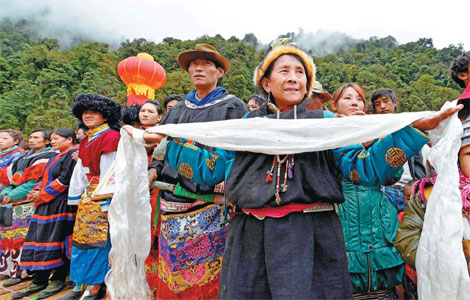
 New road links remote Tibet county to rest of the country
New road links remote Tibet county to rest of the country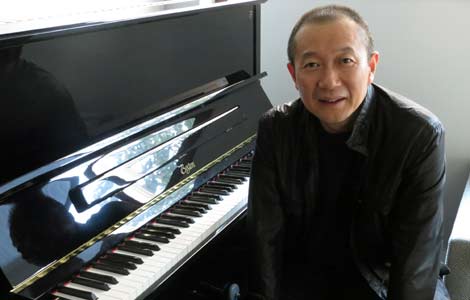
 Tan Dun premieres new work with Philadelphia Orchestra
Tan Dun premieres new work with Philadelphia Orchestra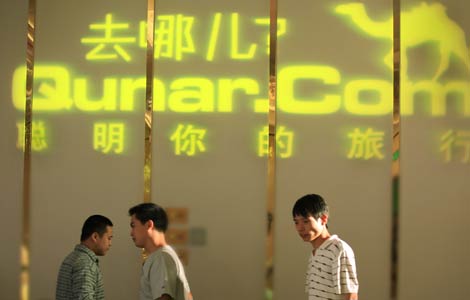
 Two firms to debut in US at higher prices
Two firms to debut in US at higher prices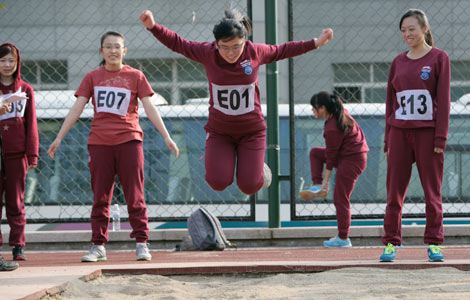
 Women fight to become China's next oceanauts
Women fight to become China's next oceanauts History under a new light
History under a new light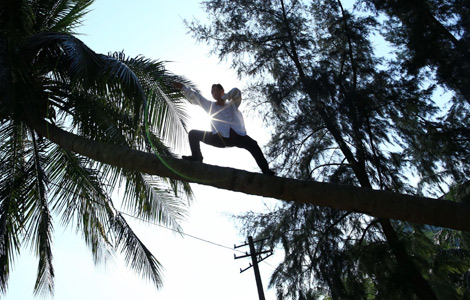
 Kung fu master becomes hit online
Kung fu master becomes hit online
 Color-blind love
Color-blind love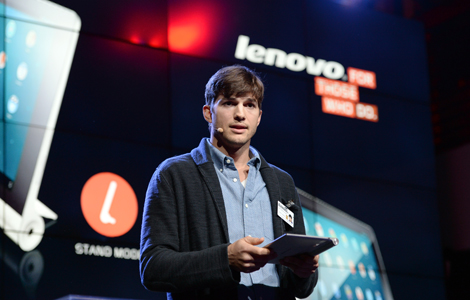
 Lenovo's new secret weapon: Hollywood star
Lenovo's new secret weapon: Hollywood star
Most Viewed
Editor's Picks

|

|

|

|

|

|
Today's Top News
Hainan Airlines reaches out across Canada
58.com's offering signals 'growing demand'
China securitization plan to include foreign banks
Firms heading home as benefits wane in China
China's PMI growth hits 18-month high
China 'urges' US to explain phone taps
Obama: US is open for business
US students compete in Chinese
US Weekly

|

|







